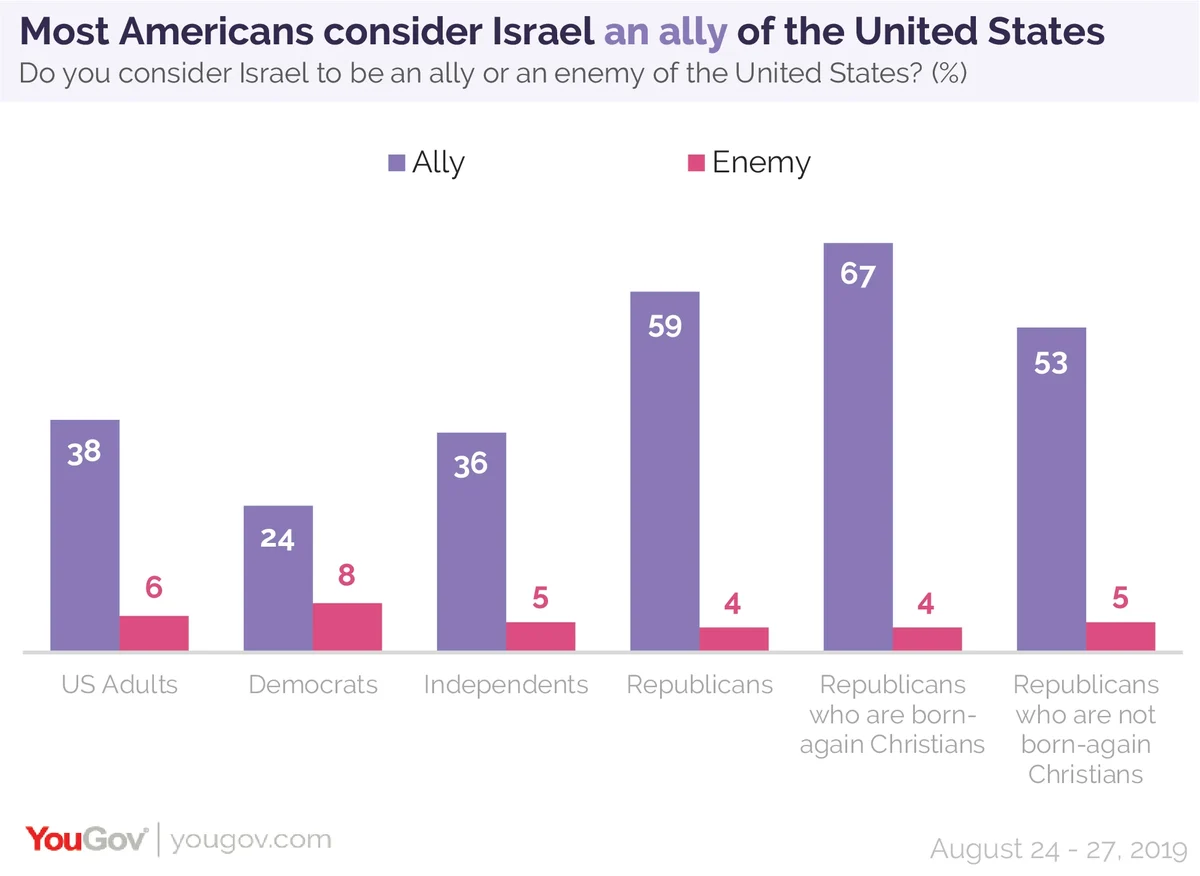In the latest Economist/YouGov Poll, both Republicans and Democrats see discrimination and anti-Semitism in the United States, but while Republicans strongly support the state of Israel, Democrats do not, and in fact, hold negative views of many of Israel’s actions.
President Donald Trump has been a strong supporter of Israel and its Prime Minister Benjamin Netanyahu, even describing him at a gathering of Jewish Republicans as “your prime minister.”
But in 2016, most Jewish voters did not support him. Many more identify as Democrats than Republicans. The partisan views of Israel are different: Democrats (24%) are far less likely than Republicans to say Israel is an ally (59%) of the United States. But among Republicans, religion matters. Republican born-again Christians are even more likely to see Israel as an ally (67%) of the United States.

Born-again Christians make up 45 percent, nearly half, of all Republicans. Less than one in four Democrats describe themselves as born-again, and most of those are African-American or Hispanic. Both born-again and non-born-again Republicans are overwhelmingly white.
The questions about American Jews and Jews in general show almost no party differences.
Few Americans in either party think the Holocaust is a myth (7 percent overall tend to agree with this) or that its impact has been exaggerated (9 percent say it has). More (14%) say Jews believe they are better than other people and 18 percent agree that the interests of Jews in the United States are different from the interests of the rest of the population. But there isn’t much of a party difference on those questions.
But mention Israel and the party differences emerge. Democrats and Republicans overwhelmingly agree that Jews have made a positive contribution to American society, but take very different views when asked whether the state of Israel makes a positive contribution to the global society. The small difference between born-again Republicans and other Republicans on the first question is much larger on the second.
Another question that shows a very large gap between born-again and non-born-again Christians that identify as Republicans is one that has Biblical roots. When asked whether the state of Israel is the historic homeland of the Jewish people, 62 percent of born-again Christian Republicans strongly agree but just 37 percent of those Republicans who are not born-again Christians do. There is also a party gap: three in four Republicans but just 42 percent of Democrats strongly agree or tend to agree.
More Americans see religious discrimination against Jews and Muslims than see discrimination against Christians. However, more religious Republicans are more likely to believe there is a great deal or a fair amount of discrimination again Christians than there is against Muslims.
59 percent overall say there are more hate crimes being committed today than there were 10 years ago. 76 percent of Democrats but only 48 percent of Republicans agree. Majorities in both parties say anti-Semitism is a serious problem in the United States, Democrats say this more than Republicans.
Race, however, not religion, continues to provide more people with a sense of personal threat. More than a third (38%) of blacks in this poll say they have felt personally threatened in the last three years because of their skin color. A quarter of Hispanics say they have felt threatened because of their ethnicity. 16 percent of born-again Christians say they have felt threatened because of their religion.
See the full toplines and tables results from this week's Economist/YouGov poll.
Related: When Trump took office, Republicans’ most important issue was the economy. Now, it’s immigration.
Image: Getty










